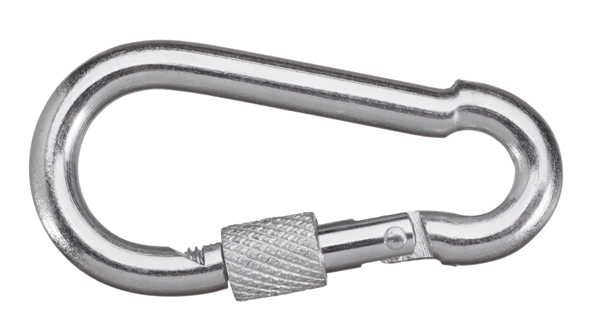Prioritize safety discussions
What do safety meetings and the departed comedian Rodney Dangerfield have in common? They get no respect.

Eric Taylor, safety director at Palmetto Propane Fuels and Ice, provides his team members with a physical safety reminder that they can carry with them every day – carabiner clips with safety locks. (Photo: maksime/iStock / Getty Images Plus/Getty Images)
Let’s face it. Too many employers – not just in the propane industry – view safety meetings as a sort of pro forma obligation without thought for how those meetings serve to reduce incidents and increase efficiencies. Done right, safety meetings systematically create employee knowledge and encourage gut checks on critical safety policies and procedures that are not always part of initial formal training.
Your delivery drivers, technicians and customer service representatives are on the “safety front line” every day and are perfect ambassadors to share their safety experiences with colleagues so they can learn from one another about what went right and what went wrong.
Not everyone wants to talk about their mistakes, but when they are encouraged to speak freely, it becomes clear that others may have had similar experiences. Sharing those experiences can provide a sense of camaraderie and trust among employees and management.
Peer pressure
Ryan Quiggle, director of health, safety and environment at Superior Plus Energy Services, understands the importance of regular safety communications among his team, especially the challenges of communicating with a mobile workforce.
“With the majority of our workforce being field-based and independent, it is imperative that safety meetings are held in person and structured to engage the attendees through peer participation and discussion around unsafe conditions experienced on the job,” says Quiggle.
While I encourage folks to get the Propane Education & Research Council’s series of Safety Talks, here are a few more techniques for successful safety meetings used by propane professionals:
Let’s play ‘Jeopardy’
Tom Dunn, safety director of the Iowa Propane Gas Association, knows a thing or two about engaging safety meetings and uses propane “Jeopardy” to help get the job done.
“I have found that anything you can do to get your participants interested and entertained helps your safety meeting become memorable,” says Dunn. “It is one thing to be able to answer ‘A,’ ‘B,’ ‘C,’ ‘D’ during a review, but when you have to provide the answer, you really get the point across. Competitive spirit in an entertaining format like ‘Jeopardy’ does that.”
Dunn is right – propane “Jeopardy” is great. So go online, check out the many free templates, and be your own “Jeopardy” master of ceremony.
A safety reminder
Eric Taylor, safety director at Palmetto Propane Fuels and Ice, likes to provide his team members with a physical safety reminder that they can carry with them every day – carabiner clips with safety locks.
“I recently had a safety meeting with our entire staff. I used carabiner clips with locking safety screw gates on them,” explains Taylor. “The clip illustrated that we do a good job with safety but could always do better to ensure that we always do everything in a safe manner and that no shortcuts are ever taken.
“Our team responded very well, and I encouraged them to carry the clips on their key rings to have a continuous reminder of our commitment to safety and professionalism,” Taylor adds.
Safety meetings are vital to ensure that what has already been learned is nurtured and retained.
They need not be complicated or time-consuming. Fifteen minutes can be plenty of time.
Stick to one topic per meeting.
Engage your team to the point that they actually take ownership of “their meeting” and understand that it’s their safety and livelihoods that are most important.
Stuart Flatow spent 18 years as the Propane Education & Research Council’s vice president of safety and training before stepping down in February 2019.
NOTE: The opinions and viewpoints expressed herein are solely the author’s and should in no way be interpreted as those of LP Gas magazine or any of its staff members.
















